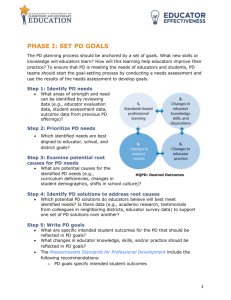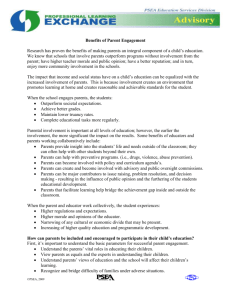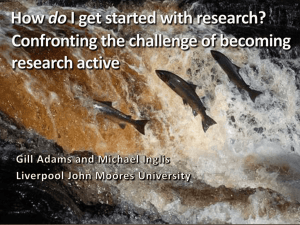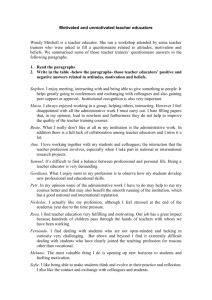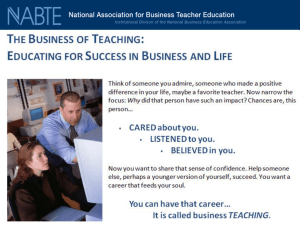T Quick reference guide
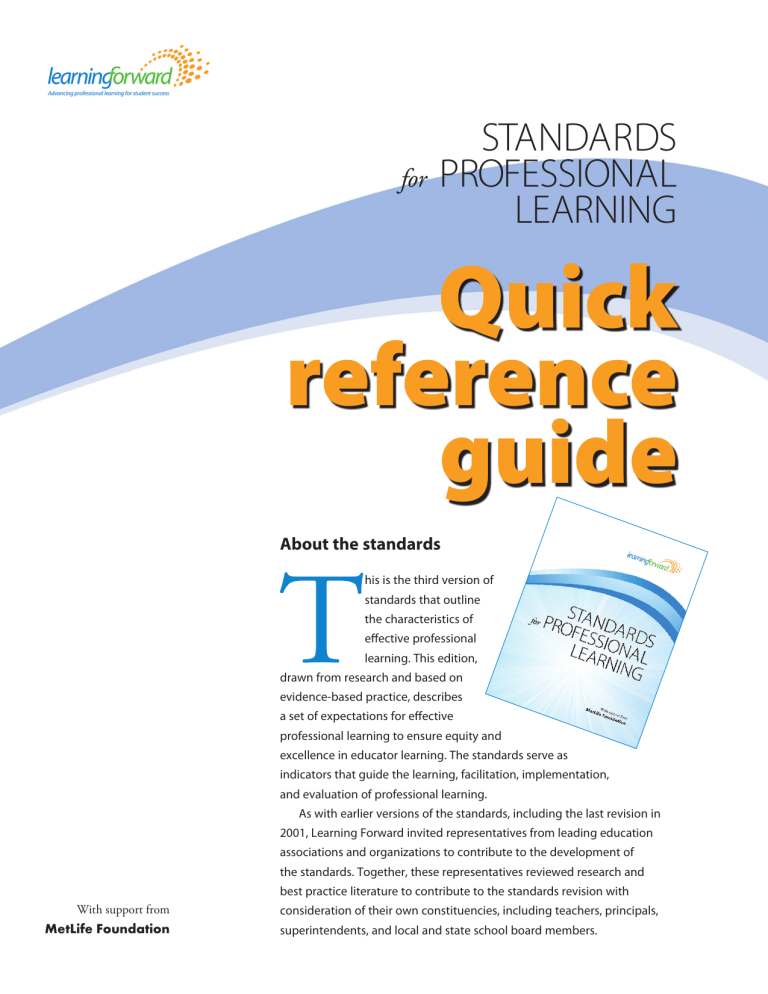
With support from
MetLife Foundation
for
StandardS profeSSional learning
Quick reference guide
About the standards
T his is the third version of standards that outline the characteristics of effective professional learning. This edition, drawn from research and based on evidence-based practice, describes a set of expectations for effective professional learning to ensure equity and excellence in educator learning. The standards serve as indicators that guide the learning, facilitation, implementation, and evaluation of professional learning.
As with earlier versions of the standards, including the last revision in
2001, Learning Forward invited representatives from leading education associations and organizations to contribute to the development of the standards. Together, these representatives reviewed research and best practice literature to contribute to the standards revision with consideration of their own constituencies, including teachers, principals, superintendents, and local and state school board members.
Quick reference guide
StandardS for profeSSional learning
Professional learning that increases educator effectiveness and results for all students ...
dAtA:
Professional learning that increases educator effectiveness and results for all students uses a variety of sources and types of student, educator, and system data to plan, assess, and evaluate professional learning.
StAndARdS foR PRofeSSionAl leARning
leARning
CommunitieS:
Professional learning that increases educator effectiveness and results for all students occurs within learning communities committed to continuous improvement, collective responsibility, and goal alignment.
leARning deSignS:
Professional learning that increases educator effectiveness and results for all students integrates theories, research, and models of human learning to achieve its intended outcomes.
leAdeRShiP:
Professional learning that increases educator effectiveness and results for all students requires skillful leaders who develop capacity, advocate, and create support systems for professional learning.
imPlementAtion:
Professional learning that increases educator effectiveness and results for all students applies research on change and sustains support for implementation of professional learning for long-term change.
ReSouRCeS:
Professional learning that increases educator effectiveness and results for all students requires prioritizing, monitoring, and coordinating resources for educator learning.
outComeS:
Professional learning that increases educator effectiveness and results for all students aligns its outcomes with educator performance and student curriculum standards.
Relationship between professional learning and student results
1.
When professional learning is standards-based, it has greater potential to change what educators know, are able to do, and believe.
2.
When educators’ knowledge, skills, and dispositions change, they have a broader repertoire of effective strategies to use to adapt their practices to meet performance expectations and student learning needs.
3.
When educator practice improves, students have a greater likelihood of achieving results.
4.
When student results improve, the cycle repeats for continuous improvement.
1.
Standardsbased professional learning
2.
Changes in educator knowledge, skills, and dispositions
This cycle works two ways: If educators are not achieving the results they want, they determine what changes in practice are needed and then what knowledge, skills, and dispositions are needed to make the desired changes.
They then consider how to apply the standards so that they can engage in the learning needed to strengthen their practice.
4.
Changes in student
results
3.
Changes in educator practice
QUICK REFERENCE GUIDE Standards for Professional Learning 800-727-7288 www.learningforward.org
Quick reference guide
StandardS for profeSSional learning
4 prerequisites for effective professional learning
T he seven new standards focus attention on educator learning that relates to successful student learning.
Implicit in the standards are several prerequisites for effective professional learning. They are so fundamental that the standards do not identify or describe them. These prerequisites reside where professional learning intersects with professional ethics.
Professional learning is not the answer to all the challenges educators face, but it can significantly increase their capacities to succeed. When school systems, schools, and education leaders organize professional learning aligned with the standards, and when educators engage in professional learning to increase their effectiveness, student learning will increase.
1 educators’ commitment to students, all students, is the foundation of effective professional learning.
Committed educators understand that they must engage in continuous improvement to know enough and be skilled enough to meet the learning needs of all students. as professionals, they seek to deepen their knowledge and expand their portfolio of skills and practices, always striving to increase each student’s performance. if adults responsible for student learning do not continuously seek new learning, it is not only their knowledge, skills, and practices that erode over time. they also become less able to adapt to change, less self-confident, and less able to make a positive difference in the lives of their colleagues and students.
2 each educator involved in professional learning comes to the experience ready to learn. professional learning is a partnership among professionals who engage with one another to access or construct knowledge, skills, practices, and dispositions. However, it cannot be effective if educators resist learning. educators want and deserve high-quality professional learning that is relevant and useful. they are more likely to fully engage in learning with receptive hearts and minds when their school systems, schools, and colleagues align professional learning with the standards.
3
Because there are disparate experience levels and use of practice among educators, professional learning can foster collaborative inquiry and learning that enhances individual and collective performance. this cannot happen unless educators listen to one another, respect one another’s experiences and perspectives, hold students’ best interests at the forefront, trust that their colleagues share a common vision and goals, and are honest about their abilities, practices, challenges, and results. professional accountability for individual and peer results strengthens the profession and results for students.
4 like all learners, educators learn in different ways and at
different rates. Because some educators have different learning needs than others, professional learning must engage each educator in timely, high-quality learning that meets his or her particular learning needs. Some may benefit from more time than others, different types of learning experiences, or more support as they seek to translate new learning into more productive practices. for some educators, this requires courage to acknowledge their learning needs, and determination and patience to continue learning until the practices are effective and comfortable.
QUICK REFERENCE GUIDE Standards for Professional Learning 800-727-7288 www.learningforward.org
Quick reference guide
StandardS for profeSSional learning
SuggeStionS foR uSe
S tandards for Professional Learning are designed to set policies and shape practice in professional learning. Improvement is a continuous process without a beginning or end. Because professional learning is at the core of every effort to increase educator effectiveness and results for all students, its quality and effectiveness cannot be left to chance. The standards will guide the efforts of individuals, teams, school and school system staff, public agencies and officials, and nonprofit and for-profit associations or organizations engaged in setting policy, organizing, providing, facilitating, managing, participating in, monitoring, or measuring professional learning to increase educator effectiveness and results for all students.
These standards stimulate dialogue, discussion, and analysis that lead to increased effectiveness in professional learning regardless of the state of current practice. Here are several suggestions for how various types of educators may use the standards to deepen their understanding of effective professional learning and how to strengthen professional learning for all educators.
The book Standards for Professional Learning (Learning Forward, 2011; see ordering information at right) offers a more comprehensive list.
individuAlS CAn:
•
Study the standards to develop a foundational knowledge about effective professional learning.
•
Use the standards to request improvements in professional learning in which they participate.
• apply the standards to the planning, design, facilitation, and evaluation of professional learning they lead.
SChool StAff CAn:
•
Share the standards with external assistance providers who facilitate professional learning with school staff.
•
Share the standards with parents, guardians, and community members to foster their support for professional learning as a means to increase student learning.
•
Bring the standards into all program implementation or improvement discussions.
moRe to Come learning forward, with continuing support from
Metlife foundation, will develop additional tools to support the implementation and evaluation of the standards.
“Using the standards to shape more effective professional learning will require study, thought, discussion, and planning.”
— Standards for Professional Learning oRdeR the StAndARdS todAy
Have at your fingertips the full text of the standards, including in-depth elaborations for all seven standards, related research citations, a comprehensive introduction, crosswalk between the previous and current versions, and more complete suggestions for use. item #B512
$16 for members
$20 for nonmembers order at www.learningforwardstore.org or call 800-727-7288.
SChool SyStem StAff CAn:
• post the standards on or link to the standards from the school system’s website.
•
Use the standards as criteria for evaluating the effectiveness of all professional learning.
• prepare a resolution that the school trustees adopt the standards as expectations for all professional learning.
QUICK REFERENCE GUIDE Standards for Professional Learning 800-727-7288 www.learningforward.org
